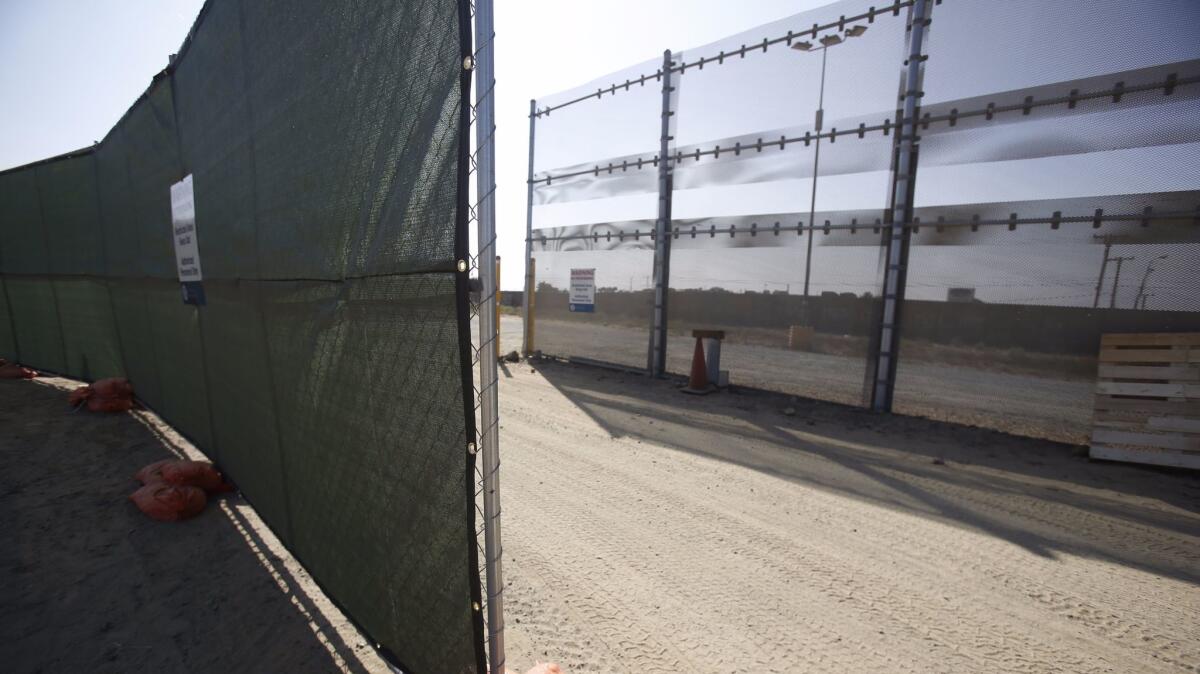Fence rises around site for border wall models; law enforcement weighs special area for protesters

- Share via
The Otay Mesa site where models of competing proposals to build President Trump’s border wall are to be built is now nearly surrounded by a chain-link fence, though there is still no official timeline for when companies that won a bidding contest will begin work.
Over the last week, the approximately 8-foot-high fence has been constructed around the building site. A green screen on the fence blocks views of the work on the prototype walls and is plastered with signs from Customs and Border Protection designating it a restricted area and warning off trespassers.
The fencing is the most visible sign of preparation for the wall work — the first step in the Trump administration’s controversial quest to construct hundreds of miles of new wall along the southwest border.
Although there is no start date, Customs and Border Protection officials have met with the San Diego County Sheriff’s Department to discuss the construction, which could draw protests.
The department is considering setting up a designated protest area for opponents, sheriff spokesman Ryan Keim said in a statement.
“In our effort to better protect the people of this county, the department is currently evaluating the need and possible location of a ‘free speech’ area where citizens can peacefully express their viewpoints,” Keim said in a statement.
“The Sheriff’s Department recognizes the high-level of emotions associated with this project and we are committed to providing the highest levels of law enforcement services in our effort to protect our communities,” the statement said.
The possibility of protests has shadowed the wall-building project since the government first solicited bids for the prototypes in March.
The 76-page bid request includes a section on security, advising contractors they are responsible for security for their equipment and workers, and requiring a security plan — including detailed provisions for “fall-back positions, evacuation routines and methods, muster area … in the event of a hostile attack.”
In another section, bidders were asked about any prior work on controversial jobs. “Describe your experience executing high profile, high visibility and politically contentious design build projects,” the proposal said.
On Wednesday, the Wall Street Journal reported that Customs and Border Protection had sent a memo Sept. 6 to state and local law enforcement warning of protests and potential violence. The memo apparently warned that protests could be similar to those against the Dakota Access Pipeline in North Dakota, which at its peak in 2016 and 2017 attracted thousands of protesters and led to hundreds of arrests.
Carlos Diaz, a spokesman for the agency, said it does not comment on leaked memos. The statements from the Sheriff’s Department did not directly address the memo.
Courts have ruled the government can regulate the time, place and manner of speech without violating the 1st Amendment, so long as the government does not restrict the content of the speech, said David Loy, legal director for the ACLU of San Diego and Imperial Counties. That power allows the government to establish “free speech zones.”
Each case is different and has to be evaluated on the specifics of where the area is set up, he said.
“The bottom line is the government has to err on protecting freedom of speech,” said Loy. “The free speech zone has to be meaningful. It can’t be a postage stamp space where three people can stand.”
Customs and Border Protection has awarded contracts to half a dozen companies to construct two kinds of wall models — one made of solid concrete, another of “other materials.” The models are to be 18 to 30 feet high and 30 feet long.
When the contracts were announced Aug. 31 and Sept. 7, Customs and Border Protection said work would begin in 30 days. But since then the agency has said repeatedly that there is no timeline for the project’s start.
The Wall Street Journal reported that the Sept. 6 memo pegged construction to begin Sept. 26.
The walls will be constructed on a patch of ground beneath a power line tower, a few dozen yards north of the border with Mexico.
Moran writes for the San Diego Union-Tribune.
More to Read
Sign up for Essential California
The most important California stories and recommendations in your inbox every morning.
You may occasionally receive promotional content from the Los Angeles Times.










